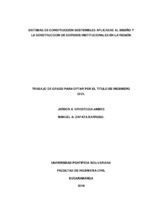| dc.contributor.advisor | Remolina Millan, Aldemar | |
| dc.contributor.author | Oroztegui Jaimes, Jerson A. | |
| dc.contributor.author | Zapata Barroso, Manuel A. | |
| dc.coverage.spatial | Seccional Bucaramanga. Universidad Pontificia Bolivariana. Escuela de Ingenierías. Facultad de Ingeniería Civil | spa |
| dc.coverage.temporal | 2010 | |
| dc.date.accessioned | 2013-08-28T16:59:47Z | |
| dc.date.available | 2013-08-28T16:59:47Z | |
| dc.date.created | 2010-02-17 | |
| dc.date.issued | 2013-08-28 | |
| dc.identifier.uri | http://hdl.handle.net/20.500.11912/954 | |
| dc.description | 97p.: (pdf); il, tablas; anexos | spa |
| dc.description.abstract | El siguiente trabajo está enfocado hacia la aplicación de sistemas sostenibles a construcciones tradicionales, con el fin de convertirlas en construcciones sostenibles, se da entonces gran importancia a la certificación LEED, cuyos requerimientos son la base de producir edificaciones sostenibles, y se enmarcan en tecnologías que reduzcan el uso de recursos naturales y que a su vez los aprovechen, sin alterar de manera importante el medio ambiente en cada uno de sus sistemas; se ven entonces tecnologías para el ahorro de agua potable, como son: recolección y tratamiento primario de aguas grises y de aguas lluvias. Para el ahorro de energía eléctrica se utilizan sistemas de paneles solares aprovechando la energía solar, ventanales sirviendo la iluminación del día, y sensores electrónicos.Para ello se toman como ejemplo las edificaciones sostenibles existentes a nivel nacional e internacional, que ofrecen información del procedimiento que se llevo a cabo para la elaboración de construcciones sostenibles, dentro del cual se muestran materiales, recursos y tecnologías, algunas ya mencionadas. Sin embargo; estas son pocas a nivel mundial ya que requieren una inversión monetaria importante que las personas y las empresas no están dispuestas a asumir sin tener en cuenta que la inversión realizada se recupera a mediano y largo plazo y luego se obtienen ganancias, a demás de promover el mejoramiento del medio ambiente y de la salud pública. | spa |
| dc.description.abstract | The following work is focused on the implementation of sustainable Systems for traditional buildings, in order to make them sustainable buildings, is then given great importance to LEED certification, whose requirements are the basis of producing sustainable buildings and are set in Technologies that reduce natural resource use and in turn to profit, without significantly altering the environment in each of their systems; are then saving technology of drinking water, including collection and primary treatment of greywater and rainwater. For power saving Systems are used solar panels harness solar energy, serving large Windows lighting the day, and Electronic sensors.
This example is taken as sustainable buildings existing national and international levels, providing information of the procedure was carried out for the development of sustainable buildings within which to show materials, resources and technologies, some already mentioned. However , these are few globally as they require significant monetary investment that individuals and companies aren’t willing to take without taking into account that the investment is recovered in the medium and long term and then make money, to others to promote improved environmental and public health. | |
| dc.language.iso | es | |
| dc.publisher | Universidad Pontificia Bolivariana | spa |
| dc.rights | Attribution-NonCommercial-NoDerivatives 4.0 International | * |
| dc.rights.uri | http://creativecommons.org/licenses/by-nc-nd/4.0/ | * |
| dc.subject | Tesis y disertaciones académicas | spa |
| dc.subject | Ingeniería civil | spa |
| dc.subject | Reciclaje de residuos | spa |
| dc.subject | Energía solar | spa |
| dc.subject | Industria de la construcción | spa |
| dc.title | Sistemas de construcción sostenibles aplicadas al diseño y la construcción de edificios institucionales en la región | spa |
| dc.type | bacherlorThesis | spa |
| dc.rights.accessRights | openAccess | spa |
| dc.type.hasVersion | publishedVersion | spa |
| dc.identifier.instname | instname:Universidad Pontificia Bolivariana | spa |
| dc.identifier.reponame | reponame:Repositorio Institucional de la Universidad Pontificia Bolivariana | spa |
| dc.identifier.repourl | repourl:https://repository.unab.edu.co/ | |


